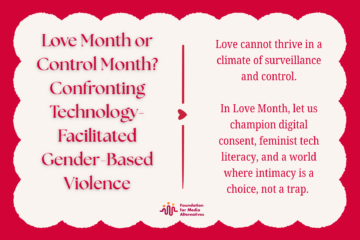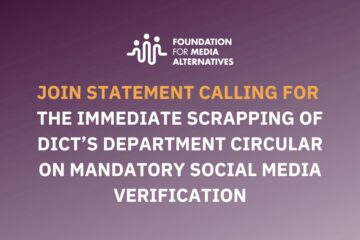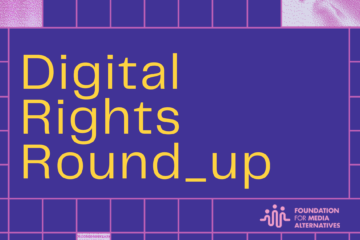On the spread of disinformation, measures against online abuse, digital habits and transactions: The FMA Digital Rights Roundup (March 16-31, 2021)
The FMA Digital Rights Roundup contains regular updates on what Filipinos need to know about their digital rights.
SC reports 80% success rate for 170,000 videocon hearings
From May 4, 2020 to January 8, 2021, 27,000 courts around the country held 170,000 videocon hearings. The Supreme Court issued Administrative Circular 37-2020 on April 27, 2020, allowing for the pilot testing of criminal case hearings via videoconferencing in select courts across the country. Through virtual court hearings, 4,683 PDLs were released in just over a week. By October 2020, more than 81,000 PDLs and children in conflict with the law were released. Read more through the link in the headline.
DICT gives backing as Open Access Act hurdles 2nd reading in House
The proposed measure aims to liberalize the local Information and Communications Technology industry. Its specific goal is to lower market penetration barriers as well as to expedite and reduce the cost of installing broadband infrastructure. The bill is intended to boost market competitiveness and encourage fair and open competition. Read more through the link in the headline.
DICT to fast-track digital infrastructure projects
The Department of Information and Communications Technology (DICT) has introduced a “Telecom Tower Watch” surveillance initiative. The project aims to shorten the time it takes and address delays in developing digital infrastructures. Read more through the link in the headline.
PH’s mobile, broadband internet speeds rank higher in February
Last month, the country ranked 83rd out of 140 countries in terms of mobile internet speed, three spots higher from its previous ranking. Its fixed broadband speed improved eight spots to 92nd. Among the ten ASEAN countries, the country ranks sixth in terms of mobile and broadband speeds. Read more through the link in the headline.
65% of Filipinos believe it’s ‘dangerous’ to publish anything critical of administration — SWS
65 percent of adult Filipinos agree with the statement, “It is dangerous to print or broadcast anything critical of the administration, even if it is the truth” This resulted in a net agreement score of +49, which the survey classified as “strong”. The survey was conducted from November 21 to 25 in 2020 using face-to-face interviews of 1,500 adults nationwide. The net agreement with the dangers of publishing criticisms against the administration was the highest in Mindanao. Read more through the link in the headline.
Public warned of increasing financial cybercrimes amid pandemic
According to Lito Villanueva, founding chair of the Fintech Alliance Philippines, cybercrime cases in the Philippines are on the rise. He also mentioned that the pandemic has pushed for a digital shift in financial transactions for almost everyone. Phishing and the use of emails that claim to be from a reputable organization are two popular online fraud schemes. The impact of cybercrime is expected to generate $10.5 trillion by 2025, according to a global think tank. Read more through the link in the headline.
Police still monitoring social media for quarantine violations
In September 2020, Joint Task Force COVID Shield developed a Facebook channel to “facilitate” user complaints. The page will be used to collect evidence from internet users in order to “alert, fine, and summon the people involved” in violating quarantine protocols. Read more through the link in the headline.
NPC: Police have no blanket power to access data of persons in custody of gov’t agency
The Philippine National Police has been warned by the National Privacy Commission (NPC) that it does not have free access to people’s personal information. After lawyer Jam Jacob wrote a scathing critique in his Newsbytes.PH column, the privacy body made the comment. Jacob mentioned the NPC was failing to do its job for its failure to rebuke the Calbayog City police for its unusual request to the court of that town to get the name of the lawyers representing “communists terrorists groups” or CTGs. Read more through the link in the headline.
DILG orders all LGUs to use StaySafe.ph
LGUs have been ordered to use StaySafe.ph application instead of their respective contact tracing systems. The app will eventually be incorporated into a digital pandemic response network. All data gathered by the automated contact tracing application must be uploaded to a central database. The contact tracing data would be connected to the monitoring and contact tracing systems used by the Department of Health. Read more through the link in the headline.
Journalists, professors warn of increasing spread of disinformation in Visayas
In a virtual regional conference on disinformation and democracy on Wednesday, March 17, local media practitioners and academic professionals warned against the spread of disinformation in the Visayas, especially during the pandemic, and shared ways to combat it. The conference was hosted by the University of the Philippines (UP) Visayas in partnership with the Consortium on Democracy and Democracy and Disinformation, UPV Division of Humanities, UPV Information and Publications Office (IPO), DYUP 102.7 FM, Rappler’s Move PH, and the Daily Guardian. Read more through the link in the headline.
PUP student council calls for accountability over alleged online harassment
A student council of PUP denounced an online harassment case involving a student and a professor. In a statement released online, they condemned the inappropriate and malicious action of the said professor and called for accountability, both from the perpetrator and the college administration. Read the full statement through the link in the headline.
Voter registration hours shortened, satellite listup suspended
The Commission on Elections (Comelec) will shorten voter registration hours and suspend satellite registration. The move is due to the rising number of COVID-19 cases in the country. Comelec said in a statement that from March 22-April 4, 2021, all Offices of the Election Officer (OEOs) nationwide will accept applications for voter registration from Mondays to Thursdays 8:00 A.M. to 3:00 P.M. Read the details through the link in the headline.
Lawmakers push tech, education campaigns vs online child sex abuse
House committee on the welfare of children approved a report pushing for strengthened laws that would fight online sexual exploitation of children (OSEC). Children’s rights groups flagged the increase of OSEC during the coronavirus lockdown, now imposed for a year in many parts of the Philippines. Read more through the link in the headline.
DPWH issues order allowing telcos to build infra along national roads
The Department of Public Works and Highways (DPWH) has issued Department Order (DO) No. 29 removing a “bottleneck” telco service providers from constructing crucial infrastructure projects along national roads. The order issued by DPWH secretary Mark Villar last March 23, 2021 amended DO No. 73 issued in 2014 outlining the department’s policy on telco and Internet infrastructures to comply with Bayanihan laws. DICT and NTC said the restrictions slowed down the rollout of critical telco infrastructure amid the rising demand for affordable, quality, and reliable ICT connectivity. Read more through the link in the headline.
International link problems cause slow, unstable internet, says PLDT
PLDT issued a statement about slow and intermittent internet speeds experienced by a lot of users. According to PLDT, the international link is serving subscribers in Visayas and Mindanao. They mentioned that they already managed traffic to other international channels to minimize impacts of the problem. Read more through the link in the headline.
Senate approves DITO franchise
The Senate approved the franchises of DITO Telecommunity Corp., another telecommunications corporation, and four broadcast companies before the session break. Senator Grace Poe, chairperson of the Committee on Public Services, shepherded the passage of the measures. Poe said that the arrival of a new major player in the telecommunications industry would spark competition for more accessible and improved internet access. Read more through the link in the headline.
Pinoys have developed ‘new digital habits’ amid Covid-19 pandemic — DTI usec
The Covid-19 pandemic has fast-tracked the digitalization journey of the Philippines, DTI USec Rafaelita Aldaba mentioned in a webinar. The number of DTI-registered online businesses went up from 1,700 in March 2020 to 82,000 in October 2020. In terms of volume of online payment transactions, there was a 624-percent and 130-percent increase in the use of InstaPay and PesoNet electronic fund transfer services. Aldaba said there is a need to set up digital infrastructures, address the regulatory constraints that limit competition, and improve the skills of the Filipino workforce. Read more through the link in the headline.
House adopts reso seeking to establish unified contact tracing system
The resolution urges the Inter-Agency Task Force for the Management of Emerging Infectious Diseases (IATF) to establish a unified contact tracing protocol. Malacañang previously admitted that contact tracing is the “weakest point” in the Philippines’ response against COVID-19. Read more through the link in the headline.
Cybercriminals taking advantage of pandemic worries, long holidays
Online fraudsters are taking advantage of uncertainties brought about by the pandemic as well as long holidays including the upcoming Holy Week. Mel Georgie Racela, executive director of the AMLC Secretariat, said in an online forum that fraud accounted for 49 percent of the total suspicious transaction reports (STRs) worth P2.7 billion filed by covered persons between March and August last year. Read more through the link in the headline.
More fake news, more at stake as national elections draw near
Civil society should help combat disinformation campaigns during the 2022 national elections, analysts say. Among social media sites, Facebook remains to be the worst perpetrator of fake news, a global poll says. Read more through the link in the headline.
Happy 27th year, #PHInternet!
On March 29, 2021, we celebrate the 27th year of #PHInternet. The country is first connected to the internet in 1994. At present where we are still facing a global health emergency, the internet has been very essential in continuing productivity may it be at work or in school.
Through the years, FMA has been advocating for an internet that genuinely prioritizes the people so that each and every Filipino will be given safe platforms for development.
Announcement:
The Foundation for Media Alternatives and Break the Fake Movement, in partnership with the Initiative for Media Freedom, Internews, USAID and the U.S. Embassy in the Philippines, launched the Media Civics Lab Seminar-Workshop Series with the goal of equipping emerging youth leaders with crucial responsible digital citizenship skills and grooming the next breed of media information and literacy (MIL) champions in different parts of the country.
The fourth seminar workshop on Social Media and the Law will happen on April 10, 2021 / Saturday from 1:00 to 4:00 PM. Speakers for the event are Disini and Disini Law and Internews. You may register through this link: https://forms.gle/tBEjw3b1SVUegBn17
Check out FMA’s FB page, Break the Fake Movement’s FB page, or Barangay Hub’s FB page for updates and announcements regarding the event.
What’s new?
Read FMA’s State of the Digital Nation: The Digital Rights Report 2020. You may read the full report through this link: https://bit.ly/3m6p348
This report is a documentation of what transpired in 2020, specifically how human rights were impacted by technology and digital innovations in the Philippines.



0 Comments